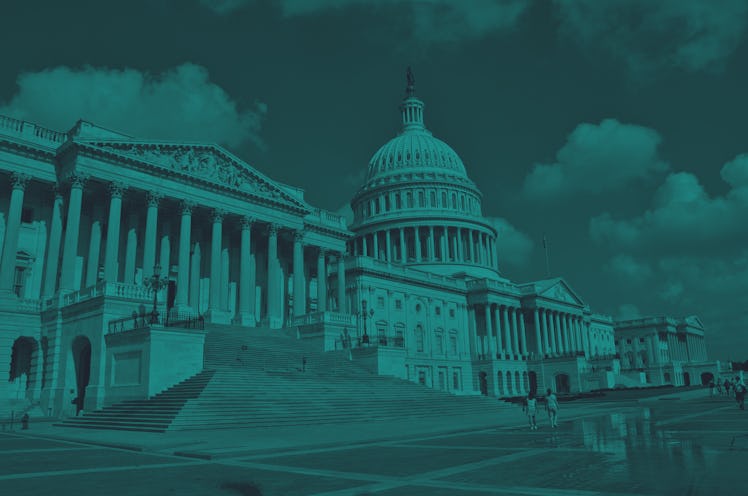This Bill Taxing AR-15s By 1,000% Could Become Law Without a Single GOP Vote
Congress is looking to do something beyond thoughts and prayers.

Gun violence is an epidemic in this country. The year 2022 has already broken mass shooting records — there were 10 of them alone over this past weekend alone, and last week, 19 children and 2 teachers were murdered at Robb Elementary school in Uvalde, Texas.
Gun violence has become the leading cause of death for kids in the United States, surpassing car accidents for the first time ever. Unfortunately and maddeningly, due to Senate rules (namely the filibuster) and President Biden’s limited ability to enact gun reform via executive action, there’s not much the current government appears able or willing to do to stop gun violence. But one new bill could creatively circumvent arcane Senate filibuster rules and make it harder to allow AR-15s — a gun model that has been used in 11 mass shootings since 2012 — to get into the hands of those who would use them to commit mass murder.
What has Congress done since the Uvalde shooting?
Recently, in the wake of the Uvalde shooting, the House Judiciary Committee held a round table pushing the “Protecting Our Kids Act.” The act consists of eight different gun measures including making it illegal to import, sell, manufacture, transfer, or possess large-capacity magazines; raising the age for purchasing a semiautomatic centerfire rifle from 18 to 21 years old and establishing federal rules regarding the safe storage of firearms.
The provisions are thought to easily pass the Democratic-led House; however, those bills all require some Republicans to vote to pass and would require 60 votes to break the filibuster to pass the gun control legislation. And that’s very unlikely to happen.
Could a tax bill be the answer to stalled gun reform?
According to Business Insider, House Democrat Donald Beyer of Virginia has proposed a new measure that might be a workaround to restricting gun use in the country.
Rep. Beyer is a member of the tax-writing Ways and Means panel, and he’s suggesting imposing a 1,000 percent excise tax on assault weapons, like the AR-15-style weapons that are often involved in mass shootings.
"What it's intended to do is provide another creative pathway to actually make some sensible gun control happen," Beyer told Insider. "We think that a 1,000% fee on assault weapons is just the kind of restrictive measure that creates enough fiscal impact to qualify for reconciliation."
The tax increase would make purchasing AR-15-style guns far more expensive, raising the price from the current range of $500 to $2,000-plus up to $5,000 to $20,000 per weapon. The idea is to raise the price of the weapons to a range where it would be less likely a younger American can afford to purchase one. New York Times analysis finds that the perpetrators of mass shootings have begun to skew younger; six out of nine of the deadliest mass shootings that have happened since 2018 have all been perpetrated by people under 21.
“It's severe enough to actually inhibit and restrict sales,” Red. Beyer said. “But also successful enough that it's not seen as an absolute ban."
Could the tax bill on AR-15-style weapons pass?
This bill could get around the tricky filibuster rules which have stalled nearly every other policy in the Biden administration. Since the tax increase would raise the revenue for the United States, it could pass without having to go through the Senate, meaning only Democrats would need to vote for it.
However, that doesn’t mean it’s a sure-fire win — more moderate Democrats, who have signaled support for actions on guns, would still have to get behind the tricky maneuver. And, while it wouldn’t be an outright ban (assault weapons were banned in the United States from 1994 to 2004, and the Bush administration let the ban expire, which was followed by a massive jump in mass shootings) it would make it harder for these weapons of war to make their way into people’s hands.
This article was originally published on